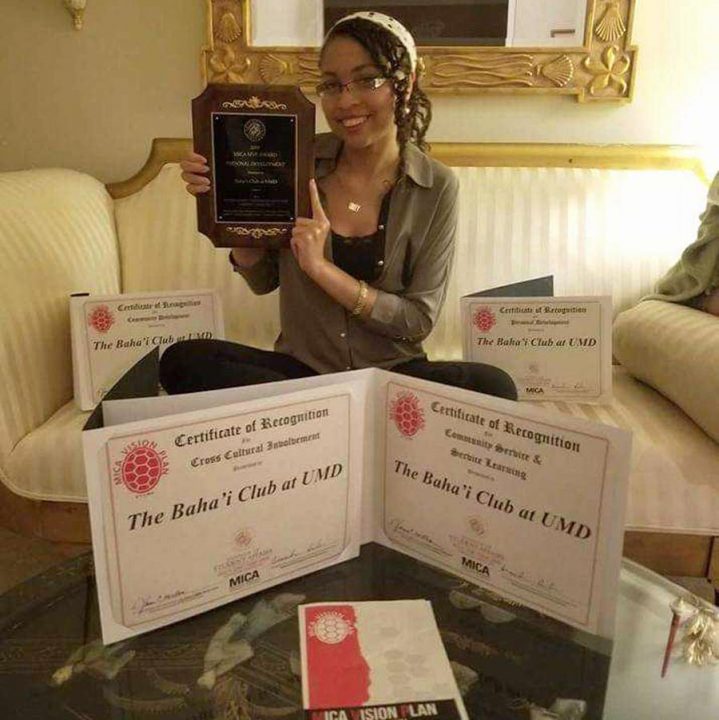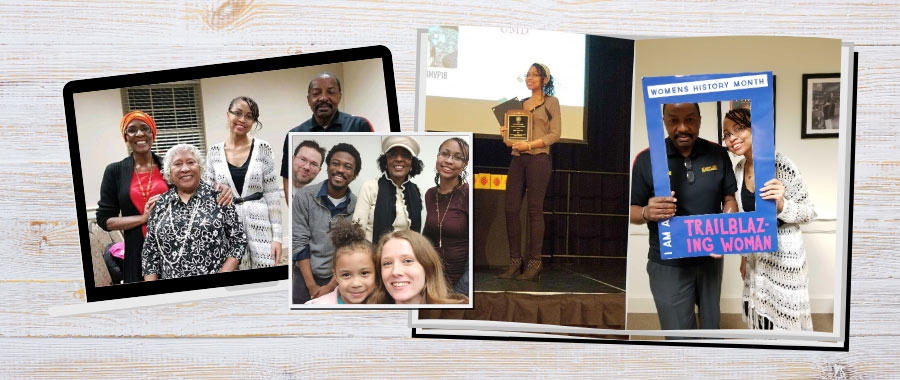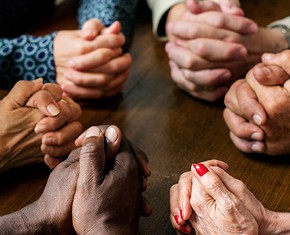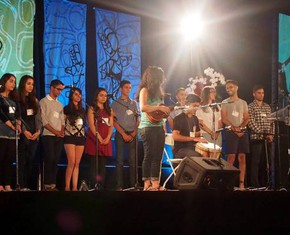The views expressed in our content reflect individual perspectives and do not represent the authoritative views of the Baha'i Faith.
Can we ever achieve world peace, or will the world end in a cataclysmic war? The Baha’i teachings promise humanity a bright future – one that depends on each of us rising to a new standard.
As a Baha’i, I have always felt a deep sense of responsibility to serve others wherever I live, when I can, and to the best of my abilities. We live in a dangerous world that seems to be breaking apart at the seams. As nations build up their stockpiles of destructive weapons, international tensions rise as a result. Hate groups stirred by ever increasing violence feel empowered to vilify, attack, and murder people of color at their whim, confident that most go unpunished for their crimes. And, now the most vulnerable seem to need protection from the very people who swore to protect and serve them. Sadly, police brutality is the leading cause of death for young black men in the United States, according to the Los Angeles Times. No one is exempt from the violence. Every ten minutes, an adolescent girl dies as a result of violence, according to UNICEF. How do we find hope in the midst of this chaos?
The Baha’i writings address the nature of these times and liken this global pain and strife to the birthing pains of labor:
We must expect these things: It is becoming evident that the world is not yet through with its labour, the New Age not yet fully born, real Peace not yet right around the corner. – Shoghi Effendi, Unfolding Destiny, p. 225
The university I graduated from reflected these birthing pains. A couple of years ago, we had over ten on-campus hate crimes in one year. The most shocking and painful one involved the tragic death of Lieutenant Collins, a young black man waiting for an Uber when a white supremacist stabbed him to death in the spring of 2017.
Those of us who feel collective pain and trauma deeply may start to wonder if God has forgotten us. Humanity is disturbed and suffering right now, as many people doubt and lose hope in the possibility that this civilization will ever experience true peace.
I would lose hope too, if I wasn’t a Baha’i. In the midst of all this pain and suffering, being a Baha’i has instilled me with a strong feeling of certitude and hope that world peace is not just possible – it’s inevitable. I understand, because the Baha’i teachings explain the twin processes of societal construction and destruction, that in order to build a peaceful, unified civilization the current world order needs to break down in an often chaotic and painful way.
Baha’u’llah, the founder of the Baha’i Faith, described that two-fold process this way:
The world’s equilibrium hath been upset through the vibrating influence of this Most Great, this new World Order. Mankind’s ordered life hath been revolutionized through the agency of this unique, this wondrous System, the like of which mortal eyes have never witnessed. – Gleanings from the Writings of Baha’u’llah, p. 136.
The winds of despair are, alas, blowing from every direction, and the strife that divideth and afflicteth the human race is daily increasing. The signs of impending convulsions and chaos can now be discerned, inasmuch as the prevailing order appeareth to be lamentably defective. – Ibid., p. 216.
Many of us can attest to the lamentably defective state of today’s world. So, although I can’t expect to avoid personal disturbance and suffering, I can at least say that I am not confused. I get it, because the Baha’i teachings have helped me understand the purpose of this process.
Baha’is believe that we have the responsibility to help humanity out of this difficult and confusing time by living lives of service in our own communities. Our role is not to simply to find a community to talk about oneness with, but realizing that communities are building blocks of civilization. Ultimately, our vision must be world embracing. Then our decisions are reflective of and will contribute to building peace on the whole Earth. When Abdu’l-Baha, the son of the founder of the Baha’i Faith, was asked to define what being a Baha’i means, he said:
To be a Baha’i simply means to love all the world; to love humanity and try to serve it; to work for universal peace and universal brotherhood. – Abdu’l-Baha, quoted by J. E. Esslemont in Baha’u’llah and the New Era, p. 71.
Baha’is around the world actively contribute to public discourse and engage in social action to aid in the welfare and progress of humanity. Many Baha’is mentor junior youth – adolescents between the ages of 11 and 14 – to support their spiritual empowerment. Baha’is host prayer gatherings for people of any faith background in their community, teach children’s classes that aid their spiritual development, and host gatherings to discuss how to translate spiritual principles into actions that responds to society’s needs.
If you’re feeling angry at injustice or saddened by the state of the world we live in, you’re paying attention, and there’s nothing wrong with that feeling. In fact, I think we are supposed to feel this way because these emotions fuel us to act and make a difference. As Baha’u’llah said:
Be anxiously concerned with the needs of the age ye live in, and center your deliberations on its exigencies and requirements. – Baha’u’llah, Gleanings from the Writings of Baha’u’llah, p. 213.
All of us need to ask ourselves what this world needs – and what we can do about it. I asked myself this question and have come to believe, more than anything else, that the world needs to fully realize, understand, and celebrate the oneness of humanity. This implies freeing ourselves from prejudice, appreciating unity in diversity, advocating for the rights of the oppressed, and helping to educate those who are unaware of how they can contribute to social justice by bridging divides, while also creating safe spaces for healing.
My university shared this perspective and launched several programs and events to promote unity on campus after Lieutenant Collins’ murder. One of these events – the “It/That Happened Project” – featured a variety of artistic performances inspired by real stories about identity and diversity to spark thoughtful dialogue. Actors performed skits that addressed racism and colorism on campus, and one dancer choreographed a dance that illustrated the beauty of kindness and working together. I performed poetry inspired by my experiences with religious and political prejudice. The event turned into a very reflective, powerful, and moving evening. The Baha’i teachings describe the power and potency of poetry:
What is poetry? It is a symmetrical collection of words. Therefore, they are pleasing through harmony and rhythm. Poetry is much more effective and complete than prose. It stirs more deeply, for it is of a finer composition. – Abdu’l-Baha’s words to Mrs. Mary L. Lucas, as quoted in “A Brief Account of My Visit to Acca”, pp. 11–14
I continue to write and recite my poetry at various gatherings to raise awareness of prejudice and injustice and spark thoughtful introspection and dialogue as to how each of us can advocate for social change. Doing that has convinced me that honest, intimate dialogue connects to and moves people more than cold rationalizing ever can. That’s why, every month for the next two years, I planned monthly events on campus as the president of the Baha’i Club, inspired by our Faith’s guidance on what should distinguish Baha’is:
You must become distinguished for loving humanity, for unity and accord, for love and justice. In brief, you must become distinguished in all the virtues of the human world – for faithfulness and sincerity, for justice and fidelity, for firmness and steadfastness, for philanthropic deeds and service to the human world, for love toward every human being, for unity and accord with all people, for removing prejudices and promoting international peace. – Abdu’l-Baha, The Promulgation of Universal Peace, p. 190.
We wanted these events to bring people together in a spirit of fellowship through elevated yet intimate conversations, and we chose speakers and topics that we thought would help raise levels of consciousness and promote love, unity and justice for all, such as religious persecution, racism, restorative justice, mental health, the harmony of science and religion, and civil and human rights. We also co-hosted religious and cultural events like vigils, meditations, festivals, etc., with other organizations.

These events showed me that despite the horrifying circumstances which brought the campus community together in the first place, we had the capacity to create something beautiful in the wake of such despair. It felt so special to see so many people enlightened, educated, and inspired by these events – to raise awareness of injustices, promote healing from prejudice, celebrate unity in diversity, and carry out acts of service. The Baha’i Club was humbled and honored to receive certificates in Community Service, Cross Cultural Involvement, Community Development, and win the MVP Award for Personal Development, Outstanding Contributions to the Campus Community at the MICA MVP Awards Ceremony in the spring of 2018.
Now that I have graduated, I continue to help my mom host monthly activities like these in our community. As a Baha’i, I am always motivated by the opportunity to make a difference, and I strive to perform prayerful actions:
Therefore, strive that your actions day by day may be beautiful prayers. Turn towards God, and seek always to do that which is right and noble. Enrich the poor, raise the fallen, comfort the sorrowful, bring healing to the sick, reassure the fearful, rescue the oppressed, bring hope to the hopeless, shelter the destitute!
This is the work of a true Baha’i, and this is what is expected of him. If we strive to do all this, then are we true Baha’is, but if we neglect it, we are not followers of the Light, and we have no right to the name. – Abdu’l-Baha, Paris Talks, pp. 80-81.
No one wants to feel hopeless and helpless. The only solution is that we all take the responsibility to use each of our unique skills and talents to create peace in our spheres of influence.
You May Also Like
Comments

















"Be anxiously concerned with the needs of the age ye live in, ...." – Baha’u’llah, Gleanings from the Writings of Baha’u’llah, p. 213.